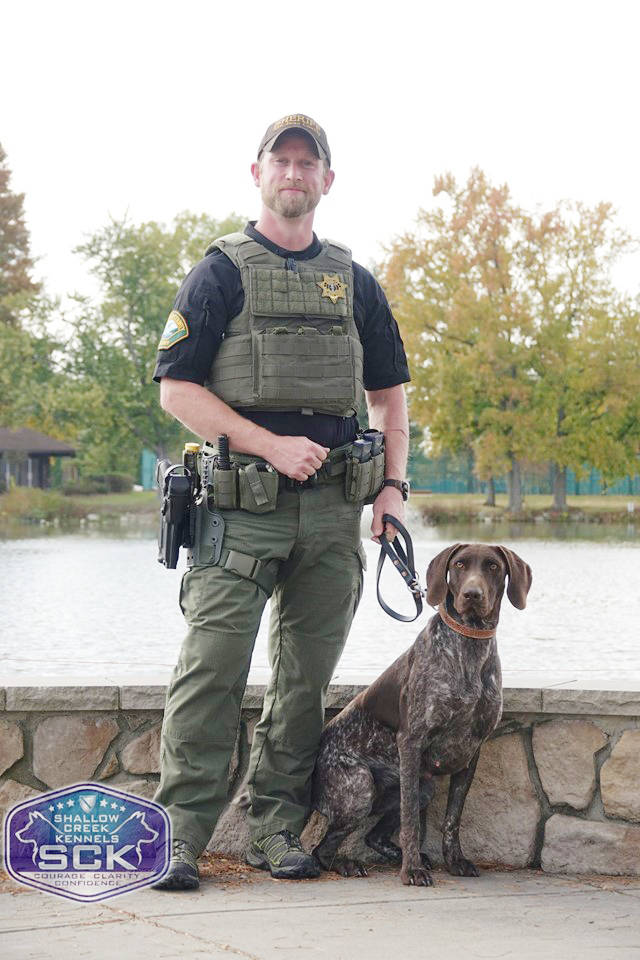There is a new deputy in town, and she’s armed with a highly sensitive nose. Sucia, a 2-year-old German shorthaired pointer, joined the San Juan County Sheriff’s Office a month and a half ago. Already she has already proven to be invaluable, according to Sheriff Ron Krebs.
“She has been involved in a lot of traffic stops. She’s had about 20 traffic stops that have resulted in a positive hit for illegal narcotics. Roughly half of those we found narcotics,” Krebs told the Town of Friday Harbor Council on Feb. 20.
The other half where drugs were not found, Krebs continued, does not mean there were not narcotics. He explained that there were probably narcotics in the vehicle recently and the odor is still present.
Once Sucia detects drugs in a car, Krebs told the town council, the vehicle is impounded, taken to the station and the Sheriff’s Office applies for and executes a search warrant.
Sucia came from the same East Coast kennel as Guss, a young German Shepherd that briefly joined the force last year. The Sheriff’s Office had to return Guss after he began to display signs of aggressive behavior.
Sucia’s handler Jay Holt, who was also Guss’, became certified to work with police dogs in September and spent a full month with Sucia out east before bringing her back to the islands.
Sucia became both nationally and state certified for drug detection in December of last year. According to Holt, she has the opposite demeanor as Guss — she is a very friendly, approachable dog. Not having to worry about people being bitten makes the deputies’ job easier, Holt said.
“Most people who have met her have been great about it; asking if she’s working and if it is okay to say hello,” Holt explained. “I love having people say hi and Sucia does too, but if we are searching she needs to focus.”
Sucia has been trained to detect cocaine, heroin and methamphetamine and methylenedioxy-methamphetamine — also known as ecstasy or molly — Holt said. She is not trained to pick up marijuana, however, since it is legal in the state, Krebs told the council.
Sucia’s sensitive nose also makes her an excellent tracker, according to Holt. There have been enough instances where local dementia or Alzheimer’s patients have wandered off, so the Sheriff’s Office decided she would assist in those cases as well.
“Sucia is currently trained to track. We do continuing training on tracking, the same way we conduct continuing narcotics training,” Holt said.
Sucia’s reward for her good work, Holt explained, is a ball. This training technique is fairly common for dogs, he added. A similar method is used by the University of Washington’s Conservation Canines, which trains ball-driven dogs to detect various animals’ scat or poop.
“Sucia is a very high energy goal-oriented dog, which was exactly what we wanted,” Holt said. Krebs told the council Sucia would pass up a steak for her ball.
There have been a few instances where Sucia has put her paws on the car scratching the paint.
“I want to avoid using harsh punishments to correct the jumping behavior. This would be the fastest way to fix the jumping, but it could stymie her drive and stop her from leading me to the source of the odor,” Holt said. “She is also a young dog, and has had no obedience training prior to coming to work with us.”
Instead, Holt is using positive praise for proper behavior while on training sniffs.
“She’s a fast learner and I’ve already noted an improvement in the jumping,” Holt said.
Despite paint scratching complaints, “She is doing fantastic and is a ball of energy,” according to Krebs.
“The more we work together, and the more we train with other handlers, the better we mesh as a unit,” Holt said. “The team at the Sheriff’s Office has been amazing in supporting Sucia and I; covering shifts so we can get out and train with experienced handlers to hone my skills and improve my knowledge in order to use Sucia to her full potential.”



